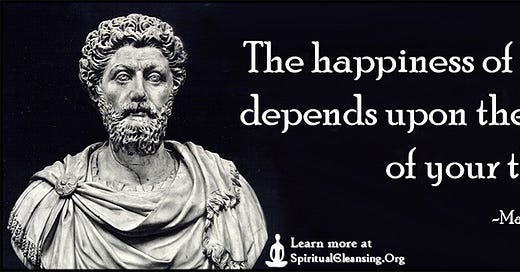Thoughtless...The Importance of Making the Time to Think
Thoughtless…The Importance of Making the Time to Think / On the (Basket)Ball: What Business Can Learn from Steph Curry / How Disgust Explains Everything / The Lighter Side of Thinking
—
Thoughtless…The Importance of Making the Time to Think
There’s a price that comes with being always on.
The demands for our attention often exceed our capacity.
We make choices that allow us to get by, but never get us to where we want to go.
The continual churn can lead to greater breadth but only at the expense of depth as we quickly react without examining the value or importance of our actions.
COVID and our 24/7 digital lives have helped to normalize this.
With meetings now taking place at a click of a button without even a walk down the hallway, we’ve lost the breaks that we didn’t even realize we were taking.
More and more we’re in “doing” mode.
Making it increasingly difficult to take the time to plan, be present… to think.
We may lack the space in our daily lives to fully process what we're doing and why we're doing it.
This can make it easy to lose sight of the big picture…and the small things
Yet, we’re constantly pushing ourselves to go faster, harder, and be more productive.
Focus.
Is gone.
There’s no time to be strategic.
To be creative.
…to be present in our own lives.
The endless distractions come at a high price.
And yet, it feels impossible to stop.
We’re caught in the middle of that churn with everyone else churning around us.
COVID and the exponential technological advances that have come with it have permanently changed work and relatedly our lives.
In some ways for the better, and in some ways not.
We were thrown camera first into this brave new reality without time to consider the implications…or anything else.
In some ways, we’ve become like the computers and phones that we’re so reliant on, with so many windows open that while we seem to be running reasonably well our actual output is sub-optimal and our batteries are draining more quickly.
With all those open “windows” we’re missing things.
Our processing power is lower.
Instead of always doing, we need to close everything and reboot.
Time to Think
Taking the time to think can feel indulgent, even a bit difficult to explain.
We should be at a meeting, responding to an email, or putting out a fire.
But what if we were able to think more clearly about it and carefully evaluate the tasks and projects we’re taking on.
Is that additional meeting really necessary?
Does that person really need another email in their inbox that will only lead several more?
And would there even be a fire to put out if we had more time for the decisions we’re making in the first place.
Regaining that ram in our heads to be more thoughtful about our choices could reduce work and potentially be the biggest time-saver in the day.
You’ll never know unless you think about it.
Thinking About It:
1. Put It on Your Calendar – setting an exact time and place for when you’ll do something dramatically increases your chances of actually doing it.
2. Remove Distractions – if you did nothing else but turn off your digital devices and close your door, you’d probably exponentially increase your clarity of thought and the decisions you make.
3. Strategically Disengage – without the energy (for another post) to think clearly this could be a wasted exercise. Taking regular breaks and doing the things you need to renew your energy is critical for clear thinking.
4. Find a thinking partner – whether you decide to work with a coach or a friend/colleague to act as a peer coach, find someone to help guide you, clarify your thinking, and move forward on your personal and professional goals.
—
RECOMMENDED LISTENS, READS:
On the (Basket)Ball: What Business Can Learn from Steph Curry
“He’s trying to make the process more robust so when factors emerge beyond his control, such as when he is tired or the crowd is yelling, he is still able to get the same output”
How Disgust Explains Everything – For psychologists who study it, disgust is one of the primal emotions that define — and explain — humanity.
—





